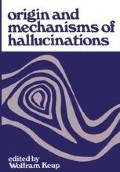Abstract
In this paper I will attempt to summarize the results of 15 years of sensory deprivation research relevant to 13 hypotheses in 10 minutes. For more details I suggest you obtain a copy of the hook edited by John Zubek[l9] entitled Sensory Deprivation:Fifteen Years of Research. One chapter is devoted to hallucinatory phenomena[23].
Access this chapter
Tax calculation will be finalised at checkout
Purchases are for personal use only
Preview
Unable to display preview. Download preview PDF.
References
W.H. Bexton, W. Heron and T.H. Scott: “Effects of decreased variation in the sensory environment”, Canadian Journal of Psychology, 8:70–76, 1954.
W.B. Cannon and A. Rosenblueth: “The Supersensitivity of Denervated Structures”, Macmillian, New York, 1949.
S.I. Cohen, A.J. Silverman and B.M. Shmavonian: “Psychophysiological Studies in Altered Sensory Environments”, Journal of Psychosomatic Research, 6:259–281, 1962.
G.C. Curtis and M. Zuckerman: “A Psychopathological Reaction Precipitated by Sensory Deprivation”, American Journal of Psychiatry, 125:255–260, 1968.
E. Evarts: “A Neurophysiological Theory of Hallucinations”. In: L.J. West (Ed.) Hallucinations, pp. l-14, Grune & Stratton, New York, 1962.
S.J. Freedman, H.V. Grunebaum and M. Greenhlatt: “Perceptual and cognitive changes in Sensory Deprivation”. In: P. Solomon et.al. (Eds.) Sensory Deprivation, pp. 58–71, Harvard University Press, Cambridge, 1961.
S.J. Freedman, H.V. Grunebaum, F.A. Stare and M. Greenblatt: “Imagery in Sensory Deprivation”. In L.J. West (Ed.), Hallucinations, pp. 108–117, Grune & Stratton, New York, 1962.
W. Heron: “Cognitive and Physiological Effects of Perceptual Isolation”. In: P. Solomon et.al. (Eds.) Sensory Deprivation, Harvard University Press, Cambridge, 1961.
W. Heron, B.D. Doane and T.H. Scott: “Visual Disturbances after Prolonged Perceptual Isolation”, Canadian Journal of Psychology, 10:13–18, 1956.
C.W. Jackson, Jr. and J.C. Pollard: “Sensory Deprivation and Suggestion: a Theoretical Approach”, Behavioral Science, 7:332–342, 1962.
P.H. Leiderman: “Imagery and Sensory Deprivation, an Experimental Study”, Tech. Rept. MRL-TDR 62–68, (Contact No. AF 33 (6l6)-6110) Wright-Patterson AFB, Ohio, May 1962.
R.F. Morgan and P. Bakan: “Sensory Deprivation Hallucinations and other Sleep Behavior as a Function of Position, Method of Report and Anxiety”, Perceptual and Motor Skills, 20:19–25, 1965.
T.I. Myers, D.B. Murphy, S. Smith and S.J. Goffard: “Experimental Studies of Sensory Deprivation and Social Isolation”, Hum RRO Tech. Rept. 66–8, George Washington University, June 1966.
A.M. Rossi, A. Furhman, and P. Solomon: “Sensory Deprivation: Arousal and Rapid Eye Movement Correlates of some Effects”, Perceptual and Motor Skills, 19:447–451 1964.
A.M. Rossi, A. Furhman, and P. Solomon: “Arousal Levels and Thought Processes during Sensory Deprivation”, Journal of Abnormal Psychology, 72:166–173, 1967.
P. Solomon et al, (Eds.): “Sensory Deprivation”, Harvard University Press, Cambridge, 1961.
J. Vernon, T.E. McGill, and H. Schiffman: “Visual Hallucinations during Perceptual Isolation”, Canadian Journal of Psychology, 12:31–34, 1958.
L.J. West (Ed.): “A General Theory of Hallucinations and Dreams”. In: L.J. West (Ed.) Hallucinations, Grune & Stratton, pp. 275–291, New York, 1962.
J.P. Zubek (Ed.): “Sensory Deprivation: Fifteen Years of Research”, pp. 207–253, Appleton Century Crafts, New York, 1969. (b)
J.P. Zubek and M. MacNeill: “Perceptual Deprivation Phenomena: Role of the Recumbent Position”, Journal of Abnormal Psychology, 72:147–150, 1967.
J.P. Zubek, L. Bayer, S. Milstein and J.M. Shephard: “Behavioral and Physiological Changes During Prolonged Immobilization Plus Perceptual Deprivation”, Journal of Abnormal Psychology, 1969.
J.P. Zubek and M. MacNeil: “Effects of Immobilization: Behaviroal and EEG Changes”, Canadian Journal of Psychology, 20:316–336, 1966.
M. Zuckerman: “Hallucinations, Reported Sensations and Images”. In: J.P. Zubek, Sensory Deprivation: Fifteen Years of Research, Appleton Century Crafts, New York, 1969.
M. Zuckerman, R.J. Albright, C.S. Marks and G.L. Miller: “Stress and Hallucinatory Effects of Perceptual Isolation and Confinement”, Psychological Monograph, 76, No. 30, (Whole No. 549), 1962.
M, Zuckerman and N. Cohen: “Sources of Reports of Visual and Auditory Sensations in Perceptual Isolation Experiments”, Psychological Bulletin, 62:1–20, 1964. (a)
M. Zuckerman and N. Cohen: “Is Suggestion the Source of Reported Visual Sensations in Perceptual Isolation?”, Journal of Abnormal and Social Psychology, 68:655–660, 1964.
M. Zuckerman and T.R. Hopkins: “Hallucinations or Dreams? A Study of Arousal Levels and Reported Visual Sensations During Sensory Deprivation”, Perceptual and Motor Skills, 22:447–459, 1966.
M. Zuckerman, H. Persky, K.D. Link and G.K. Basu: “Experimental and Subject Factors Determining Responses to Sensory Deprivation, Social Isolation and Confinement”, Journal of Abnormal Psychology, 73:183–194, 1968.
M. Zuckerman, H. Persky, K.E. Link and G.K. Basu: “Responses to Confinement: An Investigation of Sensoiy Deprivation, Social Isolation, Movement Restriction and Set Factors”, Perceptual and Motor Skills, 27:319–334, 1968. (b)
Author information
Authors and Affiliations
Editor information
Editors and Affiliations
Rights and permissions
Copyright information
© 1970 Springer Science+Business Media New York
About this chapter
Cite this chapter
Zuckerman, M. (1970). Reported Sensations and Hallucinations in Sensory Deprivation — Research Data Pertinent to Thirteen Hypotheses and a Reformulation. In: Keup, W. (eds) Origin and Mechanisms of Hallucinations. Springer, Boston, MA. https://doi.org/10.1007/978-1-4615-8645-6_12
Download citation
DOI: https://doi.org/10.1007/978-1-4615-8645-6_12
Publisher Name: Springer, Boston, MA
Print ISBN: 978-1-4615-8647-0
Online ISBN: 978-1-4615-8645-6
eBook Packages: Springer Book Archive

